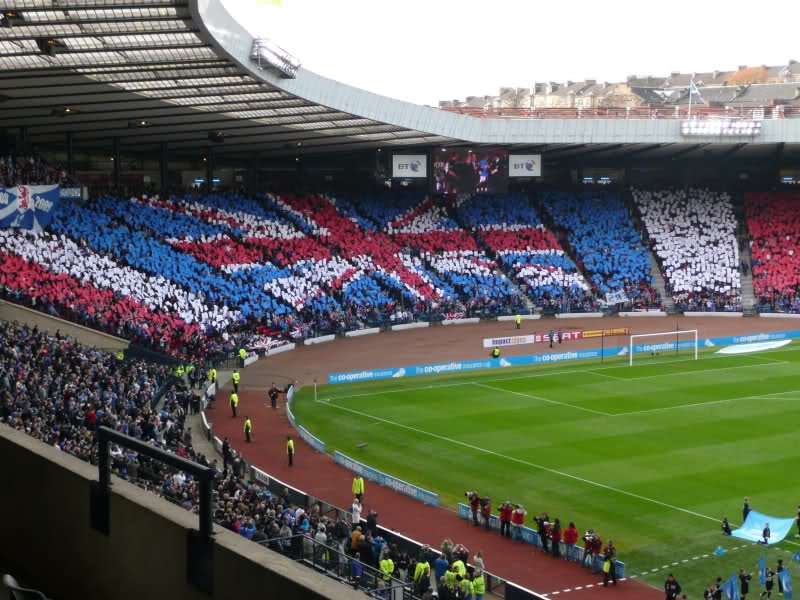Over the next few weeks and months, the SFA will finally appoint a brand new chief executive.
It will probably be Partick Thistle’s Ian Maxwell. He will inherit a shambles, there’s no other word for it.
All eyes will be on him as he tries to turn one of the most dysfunctional football bodies on earth into something that is fit for purpose.
One area where they must improve is in their media relations.
Phil posted an excellent article just last night on a series of questions he submitted last year. The SFA has dithered and delayed, and now finally appears to be ignoring them completely. Yet these questions are of major importance and of huge public interest.
They can’t be simply brushed aside, although the governing body seems to believe they should be.
Maxwell will have to get a grip on this. The culture of secrecy at the SFA has got to end. So does the culture which brought Scottish football to the brink in 2012. Phil’s questions are related to the darkest era in the history of our game, and at the centre of them is a central issue; what the SFA knew about what was happening at Ibrox during the years 2009 and 2012.
Stewart Regan was an arrogant git who didn’t care what Scottish football fans thought. He treated us with naked contempt. Maxwell cannot do the same. He has to start repairing the relationship between the governing body and the fans. He has to open that place up.
It’s not like the SFA gets real scrutiny; the Scottish media is a joke. It’s not for nothing that Phil frequently laments that it took an Irishman and an Englishman (Alex Thomson of Channel 4) to hold these people to account. That makes it all the more scandalous that the SFA believe they can simply ignore it when an accredited member of the NUJ puts questions to them. These people are hiding, and that usually means they have something to hide.
The culture of secrecy is only one of the problems. As Phil’s question make clear, the greater problem is the Hampden-Ibrox axis, which has brought this game untold trouble. And it’s clear that no real lessons were learned from that time.
This article is going to examine the Hampden-Ibrox axis and demonstrate the clear need for reform and openness. The media is another part of the problem, of course, but the bloggers put enough information in the public domain during the years 2011-18 that the governing bodies really have no excuse for some of what they’ve allowed to happen.
They cannot say they were not warned. They were. Time and time again. I am grateful to Phil for allowing me to trawl through his archives for the background story here. There is probably no more important a chronicler of these events.
Darkness Had Fallen Across Ibrox By 2010. Did The SFA Know That?
Phil’s initial questions are in relation to issues which arose in 2009. Think about that. His questions about when the SFA became aware of Rangers’ side-letters is devastating. He clearly believes that those issues were known to the SFA as early as that year.
HMRC’s investigation into Rangers had already begun, and it is certain they knew side contracts existed. They had taken ownership of a ton of information seized from the club in police raids during the 2007 raids on Ibrox, Fratton Park and St James’ Park, in relation to the Lord Stevens inquiry into bungs. The one they were looking at in relation to Rangers was the Jean Alain Boumsong deal … they found nothing to prosecute on but they did tumble onto the tax scam.
And everything the police found was handed over to HMRC.
HMRC began investigating shortly thereafter.
As it was the SFA who were supposed to have all the information relating to the contracts on file there is no way HMRC would not have contacted them.
I have long suspected that the existence of the side-contracts became known to the beaks at Hampden a long time before the drip-feed of information into the public domain by the Rangers Tax Case blog and the subsequent BBC investigations began. It makes sense that they would have known in 2009. It makes sense that HMRC would have told them.
We know who was running the association at the time.
At the helm was George Peat, who’s loyalties are well known. His number two was none other than Campbell Ogilvie, whose name was on the documents which set up EBT’s in the first place. The chief executive was none other than our old friend Gordon Smith. His tenure was disastrous and is most notable for the fact that whilst he was in office a book came out in which he’d written a chapter that alleged that his employers had long been biased against Rangers.
His personal relationship with David Murray went back years.
Is it difficult to conclude other than that the SFA decided not to do anything about what they knew.
The EBT scheme continued for another year. The club kept it going in spite of the investigations. They only stopped when they were presented with the tax bill in 2010. It was Year Zero moment, a story Phil himself broke wide open.
The SFA knew Rangers were breaking the rules. Someone inside the association concluded that it was better to ignore that. There must have been discussions, and a calculation about the enormous consequences of voiding matches going back nearly a decade … I can well understand why people with the club close to their hearts chose not to act.
But that put all of Scottish football in jeopardy, as I’ll explain next.
The SFA’s Rule Breaking Could Have Had Dire Consequences For All Our Clubs.
When a club breaks the rules it is subject to punishment.
In the case of the SFA and their decision to ignore its own regulations, they put all of Scottish football in harm’s way.
Had UEFA been minded, at any point, to open an investigation into the behaviour of our governing body the consequences for all of our clubs would have been enormous.
Look at what happened in the aftermath of Heysel.
UEFA banned all English clubs from their competitions for an indeterminate length of time.
In the end, every club who should have qualified for Europe in the next five years was excluded. Liverpool were excluded for an additional year.
The seriousness of what happened there was reflected in the punishment, but what’s important is that UEFA had demonstrated that it would take punitive action against entire associations where they deemed rule-breaking to be severe enough.
People tend to forget that Rangers’ non-disclosure of side contracts impacted on clubs outside of this country. Those players weren’t eligible to take part in European games either, and if the SFA knew that was going on they were basically involved in cheating other UEFA associations and clubs. I know for a fact that from 2010 onwards Scottish football legislators and officials at certain clubs were very concerned that UEFA might well act on that.
The decision to protect Rangers could have been devastated for the whole of our game. It was an act of corporate maleficence which placed every club in the land in jeopardy. The scale of the damage it would have caused is all too readily apparent; I doubt that it would have left anyone standing. It is impossible to imagine Celtic accepting a European ban for a brazen scam born in Ibrox and covered up in Hampden. We would have scorched the earth before accepting it.
But the crucial thing here is that there are people at the SFA who must have understood, clearly, the position they were putting every club in the land. Their decision to do nothing was taken in the cold-blooded knowledge that it might be discovered, and that punishment might follow, and once you take that into account you have no reason to believe the SFA when they say they acted with probity in 2011, when another problem arose at Ibrox.
The Wee Tax Case Confronted The SFA With A Serious Problem.
Ask any Rangers fan what killed their club and the chances are that you’ll be told it was EBT’s.
This is either because their supporters are colossally ignorant or living in denial. In fact, the EBT scandal had very little to do with what happened to that club after crisis swallowed them up in February 2012. What killed Rangers was that for years it had been running on an unsustainable basis.
Only one thing kept the crash from coming sooner; European football.
In 2010, when the club was presented with its EBT tax bill they were already largely out of options for going forward. When the financial crash came in 2008 it cut off the life-support afforded by the corrupt executives at the Bank of Scotland. When the accounts were taken over by Lloyds they saw, immediately, how much danger the club was in.
European football was critical. In 2008, I had written The End Of Rangers?, my first major online examination of the unfolding Ibrox disaster. I had based it in no small part on Phil’s vital articles on the trouble facing Murray’s companies. I believed the club was so heavily indebted and dependent on bank financing that they could easily collapse if it was removed.
What I didn’t realise at the time was the gigantic importance of European football income. It kept the lights on for a further four years, owing in no small part to our laxity in allowing Smith to secure three titles on the bounce. Without it, they really would have circled the drain in 2010 when HMRC submitted their EBT demand.
It is inconceivable to me that Rangers did not make the SFA aware of how dependent they were on this crucial source of funds. I think that by 2010 people inside Hampden were well aware that Rangers was hanging by a thread and only Group Stage money was keeping on the lights. From the moment the banks refused to keep funding the roadshow that cash was all that kept the wolf from the door. A single year without it … disastrous.
I have always believed the SFA knew the consequences of refusing Rangers a European license; the club would have entered administration almost at once. Furthermore, from 2010, as a result of the Big Tax Case, HMRC would have been a principle creditor and would have controlled the destiny of the club in a CVA. The SFA would have had to know that too.
The Big Tax Case was under appeal by the Murray Group. It would not have adversely affected their European license. But the Wee Tax Case did. Andrew Thornhill, the club’s own lawyer, had made it clear to the board that on that one the tax man had them bang to rights. There were side contracts and HMRC knew it. What’s worse is that the club had initially denied that … and been caught in the lie. Discounted Options Schemes had already been deemed tax evasion … his advice was to plead “no contest” and pay that bill at once.
That bill remained unpaid on the day the club went into administration. No attempt was ever made to negotiate a schedule to repay it. That looms over the SFA and Ibrox to this day. All we have in mitigation is the SFA’s assurance that they did everything by the book, but there is no reason whatsoever to believe that’s true.
In fact, all the evidence suggests the exact opposite. The Resolution 12 guys have identified a number of key areas where they felt the SFA was asleep at the wheel at best; at worst they were a co-conspirator and awarded that license and decided not to inform UEFA of all the facts. That’s what many of us believe and frankly with good reason.
The irony is that it was all for nothing anyway.
Rangers had already made the calamitous series of mistakes which saw all the chickens come home to roost on Valentine’s Day 2012.
It’s widely acknowledged that three football matches sealed their fate.
But actually, it was four.
Following the last of them, the SFA behaved appallingly yet again … and placed our whole game in the centre of the storm that was breaking over Ibrox.
The Four Games That Destroyed Rangers … And What Regan Did Next.
In his book, Downfall, Phil MacGiollabhain maintains that there were three games that did for Rangers; the first took place on 25 May 1967, in Lisbon. It haunted Murray from the moment he took over their club. He wanted to usurp that achievement and as it wasn’t his money he didn’t care how much of it he had to spend chasing the dream.
The phrase “they died chasing Lions” is an apt description. The obsession with winning that trophy had put their club in the deepest trouble.
By July 2011, Murray was gone.
His dream had been shattered and by that point he was a beaten man, trying to hold his business empire together as the full measure of the disaster he and his bankers had presided over in two decades became clear. He had sold up for a mere £1, forced by Lloyds to agree to a deal which allowed them to do walking away.
Ally McCoist was in the dugout. Craig Whyte was in the director’s box. All the elements of a perfect storm were coming together. At that time the scouting department at Rangers was working off two lists of potential signings. An A list and a B list.
Even Whyte knew signings would have to wait until they had that Champions League cash in the bank. He had his license, in contravention of the rules. Now all he needed do was sit back and wait for his manager to get the club to the Promised Land.
But events had already conspired against him.
Not many people realise that a crucial element in the collapse of the club had already come to fruition. It had happened in March that year, in Eindhoven. The full story of that night, and how it fits into the bigger picture, has never been fully understood.
I am grateful to Phil for his insight into the matter.
For the whole of the 2010-11 campaign, Rangers had been subjected to harsh scrutiny by European football’s governing body. And before every match they played in Europe a series of emails had gone to their press office, asking who the match delegate was and whether said delegate spoke English. The rationale behind this question was simple; the sender of those emails wanted to be sure that UEFA’s delegates would know what they were listening to.
And in March 2011, the email sender received notification that the delegate for the second leg of Rangers Europa League tie against PSV, taking place at Ibrox on St Patricks Day, would be a gentleman named Campbell, hailing from the north of Ireland.
UEFA would later cite the club for the behaviour of its fans in both the first and second legs of that tie, but Rangers’ anger was especially acute in the case of the second of them, the one at home. On that night, the UEFA delegate gave them a clean bill of health … but he was not the only agent of UEFA in the ground, and that’s where the problem was.
A delegate from FARE, Football Against Racism Europe, was also in the stand, and their report on that night was scathing, and devastating. Not only did it grab the attention of UEFA, of whom FARE is an accredited organisation, but it focussed the whole of Europe’s media on the behaviour of the Rangers fans. As a result, the club was fined and told that its supporters would be banned from their next European away match.
In the aftermath of that verdict, Martin Bain released a venomous statement which lashed out at FARE and alleged a conspiracy against the club. “”We have never said that sectarian singing is not a problem,” the statement read. “But this now has all the hallmarks of a deliberate and targeted campaign against the club.”
He was, of course, correct; the phantom emailer (whose identity, let’s face it, isn’t much of a secret or would be much of a surprise) has never been anything other than open and honest about his intentions and motivations, and he remains open about them to this day.
As a consequence of this, Rangers went into their European tie against Malmo with the crucial disadvantage of having no away supporters to cheer them on. They lost the first leg 1-0 at home. They drew the second 1-1. Would their fans have made a difference that night? We’ll never know, but their absence didn’t help.
After crashing out of the Champions League Whyte told his scouts to dump the A-List of signings.
The club was now in all kinds of trouble, pinning its hopes on Europa League group stage football to stand the slimmest chance of survival. It wasn’t to be.
Maribor took care of that, blowing them out by winning their home leg 2-1 and then snatching a 1-1 draw at Ibrox to plunge the club into anarchy.
Whyte told his scouts to dump the signing B-List.
And he told his financial officers to immediately stop paying bills as they came due.
From that moment on their fate was sealed. The SFA had broken its own rules to help them … and so Craig Whyte knew that he had friends at Hampden, friends who might even be willing to help deal with the aftermath.
And of course, he was correct.
From very early on, and certainly by November 2011, the SFA was well aware that one of its biggest clubs was facing an administration proceeding and probably much worse. Whyte did not bother to hide his intentions; his plan had always involved a switcheroo to beat HMRC over the Tax Case … from August he stopped paying any tax at all. And he reached out to the SFA for help in preparing as soft a landing as possible.
Scandalously, they agreed. Did they know he was intending to screw HMRC out of millions more? They must have, otherwise the lights would have gone out by December. Phil had written at the time about how they were living on fumes by then.
Having already risked the wrath of UEFA over side contracts, having given the club a license which deprived Celtic and other clubs of millions of pounds, the SFA was now actively involved in helping Rangers defraud the exchequer all over again.
The SFA had become party to a tax fraud.
And even worse was to come.
The SFA Had Only One Consideration In 2012: A Club Called Rangers.
At every stage in the crisis that hit Scottish football in 2012 there was one thing, and only one thing, ever present on the minds of those responsible for running our national game; that a club called Rangers take its place as high in the structure as the governing bodies could get away with.
Everything else was to be sacrificed as and when necessary.
Sporting integrity would have gone had they got their way and put the NewCo into the SPL.
The pressure they exerted on the top flight clubs was enormous, including blackmail over the Sky TV deal and the deadly provision of “four Old Firm games” which they and the media went out of their way to tell us meant there was really no choice to be made.
When that failed, they pressed on the SFL clubs to give Sevco a berth in the second tier. That campaign of vilification, scare tactics and finally attempted bribery so sickened everyone involved that Turnbull Hutton stood on the steps of Hampden and declared it corrupt.
None of that mattered.
The SFA was perfectly willing to run roughshod over anyone who got in the way.
Whatever it took to get the desired result.
They bent their own rules to the snapping point. They dreamed up the “temporary license.” In spite of later telling the world that Sevco and Rangers were one in the same they allowed Rangers to have a vote on whether to accept Sevco to the league … that’s one of the things they never talk about anymore but which breaks one of the legs off the Survival Lie.
In order for any of it to work, though, the various bits and pieces of Rangers had to be in some kind of fit state to actually contest games. When the assets were put up for sale there was a very real chance that nobody would get a deal over the line in time for the season to start; in point of fact, the agreement to purchase those assets was signed so late in the day that the “temporary license” was necessary for the club to be eligible for its first game.
And that was a scandal almost without precedent, because in their desperate scramble to certify a team called Rangers the SFA was guilty of two dreadful additional crimes against our sport; first, they allowed Sevco to play its first game without the Five Way Agreement having been signed, which removed any prospect of enforcing meaningful restrictions on the club, and secondly, and perhaps more damagingly, it left no time for due diligence on the owner of the assets.
We now know those to have been appalling errors in judgement.
Firstly, the Five Way Agreement was supposed to bind Sevco to a series of punishments for what Rangers had done. In the end, it came with a no-title-stripping “side letter” of its own, the fines the club received were miniscule, they were allowed to defer payment on football debts and the transfer ban became a “registration ban” instead, which let them sign a ream of players and use them as “trialists” until the duration of the ban was up. It was one of the most blatantly corrupt decisions I’ve ever seen as a football fan.
But of far greater import was the lack of any scrutiny of Charles Green and his associates, who we now know included a man on Interpol’s most wanted list. Speaking to Phil recently, he was scathing about a decision which, as he put it, “allowed international organised crime a foothold in Scottish football.” It is hard to think of a more serious charge against the SFA.
Charles Green and his associates were initially declared “fit and proper” to hold office at a Scottish club.
We all know what followed; a series of scandals so complete that fiction writers would struggle to do justice to it. Green himself resigned in disgrace after his nakedly racist language during a media interview saw the club condemned from every corner of the political spectrum.
It is the least of his offences and the smallest of his sins against our sport.
And just when you thought the SFA’s behaviour couldn’t be more venal or corrupt, they outdid themselves before Green was even out the door.
Glasgow’s Green And Whyte: The Hampden Cover-Up To End Them All.
Perhaps the most egregious incident in this whole stinking series of events was what happened in 2013, when Craig Whyte’s people re-emerged and accused Charles Green of defrauding him out of the assets of Rangers. His charge was simple; he said he was the man who had brought Green to the table and the two of them had an agreement that they’d jointly set up and run Sevco 5088, the company that was to acquire the broken bits of the club.
The charge is incredible, but what’s more incredible was the response to it.
First was Green himself who, in one of the most notorious press interviews ever given, freely admitted the central charge; that he and Whyte had been working together and that he had set up Sevco Scotland Limited to cut Whyte out of the deal.
The SFA’s response was even more incredible; in spite of Green himself owning up and offering a breathtakingly brazen explanation for his behaviour, which immediately confirmed him as a charlatan and liar if not an outright crook, our governing body decided not to hold an independent inquiry into the matter but instead allowed the club to investigate itself …
Have you ever heard anything like it?
The Pinsent Mason investigation, its remit narrowed to the point where it couldn’t have found evidence of wrong-doing if Green had stood in front of its people holding a sign saying Guilty As Charged, was an outrage that no other governing body would ever have permitted far less played a role in having established in the first place.
I tell people who want cast-iron evidence that the SFA was up to its neck in this whole scandal to look no further than what they allowed to happen here. The Pinsent Mason decision was one of the most obviously corrupt ever taken. It makes other notorious whitewashes look like a splash of paint on the walls. At least in those cases officialdom did the digging and used the dirt to cover itself. In this case they let the alleged criminal investigate the crime.
Nothing like it has ever happened in football before.
But Regan wasn’t done yet.
He permitted one last glorious scandal on his watch.
Dave King: A Fit And Proper Tax Cheat And The Chairman Sevco Deserved.
Rangers died after its directors took the decision not to pay PAYE and that brought the wrath of HMRC down on a club which it already had in its gunsights. Sevco rose from the grave of Rangers and the SFA allowed a man like Green to take over, with all his associations with dodgy characters right out of Central Casting.
He appointed the Easdale’s to the board; one of them had actually served a prison term for fraud. Not content with allowing that, the SFA then doubled down. They allowed Dave King to destabilise that board in full public gaze.
They allowed him to interfere in its business to an extent no other regulator would have allowed.
And then, fresh from that and with his own string of tax convictions, they allowed him to become Sevco chairman in a decision so absurd that Mike Ashley sought a judicial review into it. Can you even imagine a graver dereliction of duty from the SFA?
Football in Scotland has been brought to the brink by the people who allowed all of this. At least two of them have scuttled off with their pensions. Another, Rob Petrie, looks as if he’ll be the next President in spite of a growing chorus of opposition.
Even as I write this, King and his board are embroiled in a series of scandals which is difficult to credit.
King himself has openly defied a court order and a demand from the Takeover Panel of the City of London. The club is being financed by highly suspect means; at least one of the “soft loans” originated overseas, and officially, at least, comes from a duo one of who has his own directorship ban behind him. King told a Sevco AGM that he would fund any shortfall in this campaign and later told a court he had no money at all.
No scrutiny of King’s bona fides have ever been mooted at Hampden far less organised. He remains, formally, a “fit and proper person” in the eyes of the SFA.
Questions about King and his status are routinely asked by bloggers and fans, and are just as routinely ignored.
He is clearly the owner Sevco deserves … but does the rest of Scottish football deserve this stain on its reputation too?
Ian Maxwell’s First Task Is To Dismantle The Hampden-Ibrox Nexus.
As this article has made abundantly clear, the SFA is guilty of serious failures of governance at best and at worst of being a co-conspirator in a number of destructive scandals. The need for a full scale reform there is critical, and it has to include an inquiry into everything that has come to pass. As Phil has said, and as I never cease to point out, this is not about Rangers or a club calling itself that. This is about Hampden and the SFA.
The thing is, except for what happened at Hearts, I cannot think of another club who the SFA has allowed to get into such a state because of its owners and there is no way the SFA would ever have let another Romanov type figure take a stake in that club. It is equally hard to believe that they would have authored a scheme to put a Hearts NewCo in the top flight had that eventuality arose or that they would have bent so many regulations for them.
Hampden has allowed successive Ibrox operations to corrupt the sport and get themselves into the deepest trouble, and this would be unacceptable even if they had not spent every day since these matters first came to light telling us how vital a club called Rangers is to the wellbeing of the game. Few of us believe that, but their extraordinary laxity does not tally with the assertion itself. In the name of Rangers have all these rules been bent and broken.
As Sevco enters a brand new era of crisis, Maxwell’s first job might well be telling them that they are on their own, that they can sink or swim without the governing body involving itself in the affair except to keep one eye on the integrity of the sport. But he has to go further. The inquiry Celtic wanted was just the start, and as we wait for it the association could assert its commitment to greater transparency in the future by answering some questions.
Phil has sent them a list to be starting with.
He is not alone in that, but he may be unique in that he’s done so with the advantage of holding a valid NUJ membership card.
Since this whole series of events started, it has fallen on people out with the Scottish mainstream media to scrutinise the goings on at Ibrox and Hampden; Roy Greenslade, one of the foremost media commentators in Britain, has slammed the local media here for the way it rolled over and refused to question the way our game has been run.
Phil has done more from Ireland than any of the hacks whose feet are on the ground in the city where all this has gone on, and Alex Thomson brought honesty, integrity and real scrutiny to these affairs from Channel 4 in London.
The SFA only gets away with this blatant corruption because the local press here refuses to hold them to account. No wonder they think they can brass-neck those few who dare ask the questions that matter. That has to end. The secrecy has done nobody involved any favours.
Even Ogilvie and Regan may yet be held to account for what they permitted and were involved in … it’s just a matter of establishing the inquiry that’ll get to the heart of it all.
Maxwell has a daunting task in front of him, but if he’s not up to the job he should never have applied for it in the first place. How he handles these matters, how he responds to his very earliest tests, will determine how successful or otherwise his tenure proves to be.
The Scottish media is probably beyond reform. I’ll take a look at their role in all this at another time.
For tonight, let’s just be thankful for a Few Good Men, none of them residents in the land where all this went on.
That is a dreadful indictment of those who’s duty it was to do the job they ended up doing instead
Join the best Celtic Facebook Group there is right here.
Like our Facebook page and comment on and share the articles by clicking here.
You can also follow us on Twitter at @The_Celtic_Blog








